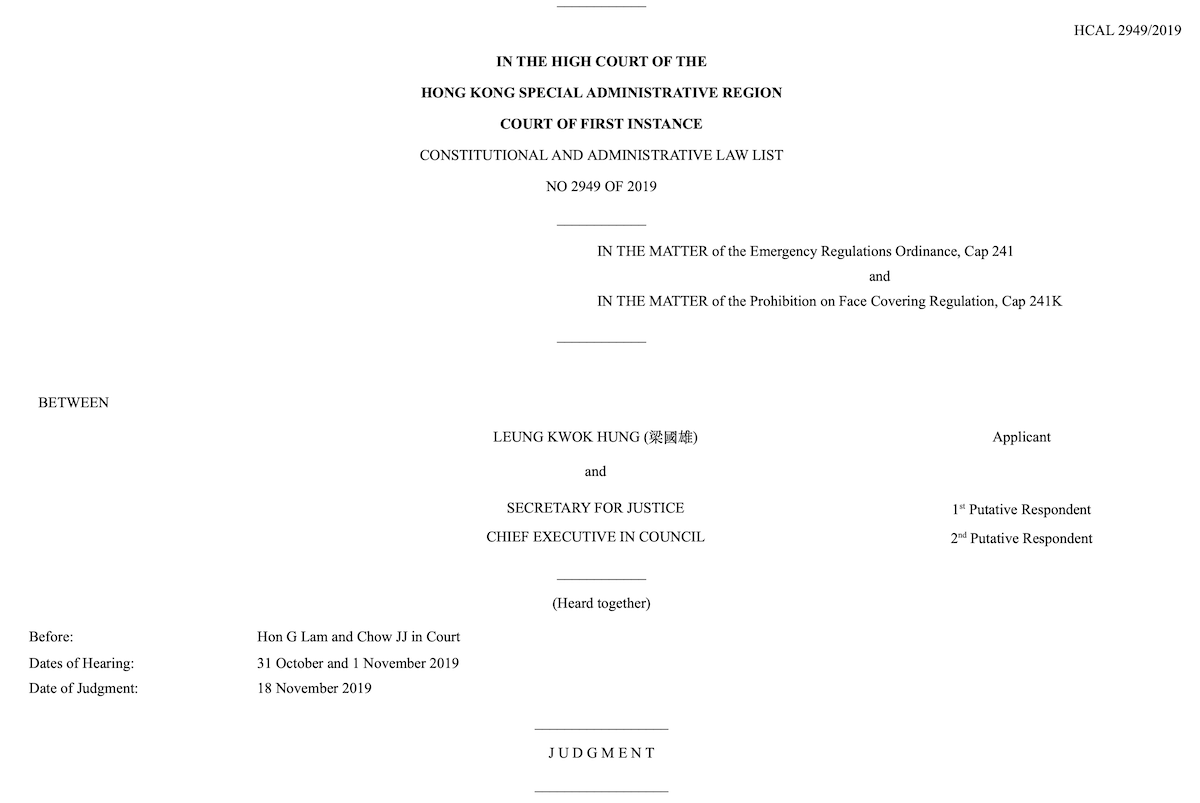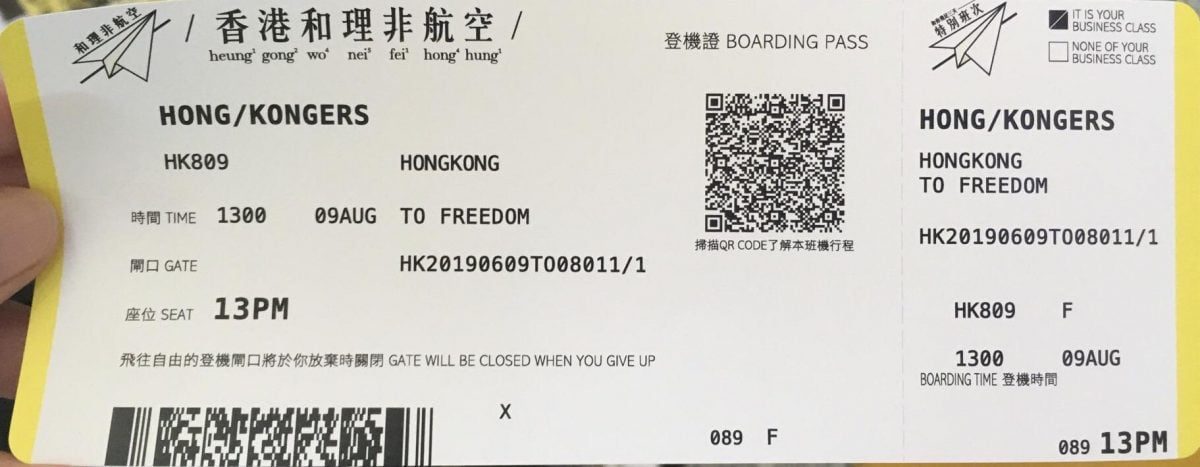The ‘Mask law’ introduced by Carrie Lam under the Emergency Regulations Ordinance, Cap 241 was found to be unconstitutional by the High Court in a Judgement issued today, 18 November, 2019.
There were two separate court actions against the ‘Mask Law’ and they were heard together. Here is the press summary, the full judgement can be found here HCAL2945/2019 and HCAL2949/2019
IN THE HIGH COURT OF THE
HONG KONG SPECIAL ADMINISTRATIVE REGION
COURT OF FIRST INSTANCE
CONSTITUTIONAL AND ADMINISTRATIVE LAW LIST
NO 2949 of 2019
IN THE MATTER of the Emergency Regulations Ordinance, Cap 241
and
IN THE MATTER of the Prohibition on Face Covering Regulation, Cap 241K
Between
LEUNG KWOK HUNG (梁國雄)
and
SECRETARY FOR JUSTICE – 1st Putative Respondent
CHIEF EXECUTIVE IN COUNCIL – 2nd Putative Respondent
DATES OF HEARING: 31 October and 1 November 2019
DATE OF JUDGMENT: 18 November 2019
REPRESENTATION:
Gladys Li SC, Mr Johannes Chan SC (Hon), Mr Earl Deng, Mr Jeffrey Tam, Mr Geoffrey Yeung and Ms Allison Wong, instructed by Ho Tse Wai & Partners, for the 1st to 24th Applicants in HCAL 2945/2019
Mr Hectar Pun SC, Mr Lee Siu Him and Mr Anson Wong Yu Yat, instructed by JCC Cheung & Co, assigned by the Director of Legal Aid Department, for the Applicant in HCAL 2949/2019
Mr Benjamin Yu SC, Mr Jenkin Suen SC, Mr Jimmy Ma and Mr Mike Lui, instructed by the Department of Justice, for the Putative Respondents in both HCAL 2945/2019 and HCAL 2949/2019
SUMMARY:
1. These are two applications for judicial review seeking to impugn the Emergency Regulations Ordinance (Cap 241) (“ERO”) and the Prohibition of Face Covering Regulation (Cap 241K)(“PFCR”) made thereunder as being invalid and unconstitutional.
2. By Ground 1, the applicants contend that the ERO is unconstitutional because it amounts to an impermissible grant or delegation of general legislative power by the legislature to the Chief Executive in Council (“CEIC”) and contravenes the constitutional framework under the Basic Law. The court holds that the ERO, insofar as it empowers the CEIC to make regulations on any occasion of public danger, is incompatible with the Basic Law, having regard in particular to Arts 2, 8, 17(2), 18, 48, 56, 62(5), 66 and 73(1) thereof. The court leaves open the question of the constitutionality of the ERO insofar as it relates to any occasion of emergency.
3. As to Ground 2, the court holds that the ERO was not impliedly repealed by s 5 of the Hong Kong Bill of Rights Ordinance (Cap 383) (“HKBORO”). Insofar as it is invoked in situations not falling within the kind of public emergency referred to in the HKBORO, the Bill of Rights is not suspended and the measures adopted will have to comply with it.
4. On Ground 3, the court holds that the ERO does not in itself fall foul of the “prescribed by law” requirement (ie the principle of legal certainty). Where regulations and measures are adopted under the ERO that curtail fundamental rights, the entire relevant body of law including the regulations and measures have to be taken together to see whether they meet the requirement of sufficient accessibility and certainty.
5. Under Ground 4, the applicants contend that the general words in s 2(1) of the ERO are not to be construed as allowing the Government to adopt measures that infringe fundamental rights of the individual and that the PFCR is therefore beyond the power conferred on the CEIC by the ERO. The court finds that it is not necessary to deal with this Ground and does not express any view on it.
6. Under Ground 5A, the applicants contend that s 3 of the PFCR fails to satisfy the proportionality test (as explained in Hysan Development Co Ltd v Town Planning Board (2016) 19 HKCFAR 372, §§134‑135). The court holds that the provisions in s 3(1)(a), (b), (c) and (d) of the PFCR are rationally connected to legitimate societal aims that the respondents intend by those measures to pursue but the restrictions that sub‑paragraphs (b), (c) and (d) impose on fundamental rights go further than is reasonably necessary for the furtherance of those objects and therefore fail to meet the proportionality test.
7. Under Ground 5B, the applicants contend that s 5 of the PFCR fails to satisfy the proportionality test. The court holds that the measure introduced by s 5 of the PFCR is rationally connected to the legitimate societal aims pursued but the restrictions it imposes on fundamental rights also go further than is reasonably necessary for the furtherance of those objects and therefore fail to meet the proportionality test.
8. In the light of these conclusions, there will be a further hearing for the parties to make submissions on the appropriate relief and costs.



